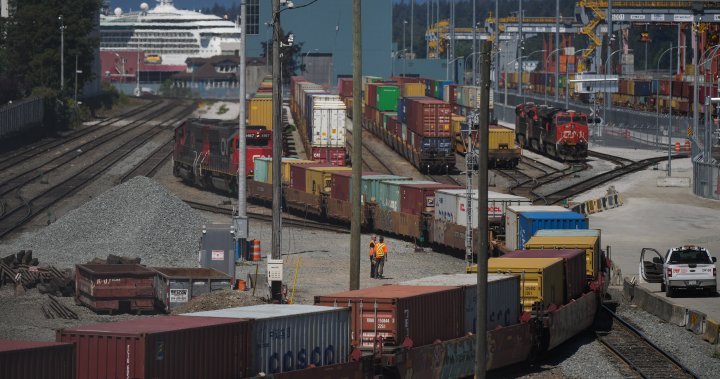More than 9,000 workers at Canada’s two major railways could be either on strike or locked out as of Thursday, disrupting supply chains relied upon by many industries.
The union representing thousands of workers at Canadian Pacific Kansas City Ltd. says it has served a 72-hour strike notice to the railway.
The Teamsters Canada Rail Conference issued a news release saying unless the parties can reach a last-minute agreement, workers will be off the job as of 12:01 a.m. Eastern time Thursday.
Not long after the union’s statement, CN Rail issued a notice that it intends to lock workers out at that same time unless an agreement or binding arbitration is achieved.
The company says no meaningful progress has occurred despite weekend labour negotiations.
“Unless there is an immediate and definite resolution to the labour conflict, CN will have no choice but to continue the phased and progressive shutdown of its network which would culminate in a lockout,” the company said in a release.

Both CPKC and Canadian National Railway Co. have been halting shipments in preparation for potential work stoppages by a combined 9,300 workers at the two railways. On Friday, CN schedules showed that it started barring container imports from U.S. partner railways. The two companies have already halted shipments that need cooler temperatures, such as meat and medicine.

Get daily National news
Get the day’s top news, political, economic, and current affairs headlines, delivered to your inbox once a day.
Industry groups have expressed concern about what a work stoppage could do, such as raising expenses and delaying shipments for manufacturers.
On Thursday, federal Labour Minister Steven MacKinnon rejected a request from CN to impose binding arbitration, saying he wants the company to bargain in good faith.
The union responded to CN’s Sunday announcement in a news release accusing the company of being “willing to jeopardize the Canadian economy, and hold supply chains hostage to improve their bottom line.”
A spokesperson for CPKC referred The Canadian Press to previous statements. On Friday, the company said it’s committed to bargaining in good faith and reiterated a standing offer to resolve the matter through binding arbitration.
“While CPKC continues to move as much freight as possible prior to a potential work stoppage, we are taking steps for a safe and orderly shutdown of railway operations in Canada,” the company said in a statement Friday.
CPKC previously served a lockout notice to the union for 12:01 a.m. Thursday.

The union said it’s being forced to serve strike notice to the company to protect workers.
“We do not take this decision lightly, but CPKC’s reckless actions have forced our hand. By unilaterally locking out our members and changing the terms of the collective agreements, they are stripping our members of essential protections,” said president Paul Boucher in the release.
CPKC spokesman Patrick Waldron said the company disputes the union’s claim that CPKC is unilaterally changing the terms of the collective agreements, calling it a gross misrepresentation of the truth.
“The only contract we are negotiating at this time is a status quo agreement,” he said.
In its release Friday, the company said that for its train and engine workers, it’s “focused on a status quo-style contract renewal covering three years with competitive wage increases that are consistent with recent settlements with other railway unions and maintains the status quo for all work rules.” The company said this offer “fully complies with new regulatory requirements for rest.”

For the rail traffic controller workers, the company said it has proposed a renewed agreement that would deliver competitive wage increases.
On Sunday, about 10 hours before the union issued its statement about the strike notice, MacKinnon posted on X that the two rail companies were continuing to negotiate with the union alongside federal mediators.
Rail lines carry more than $1 billion worth of goods each day, according to the Railway Association of Canada. More than half of the country’s exports travel by rail.
— With files from Christopher Reynolds
© 2024 The Canadian Press



